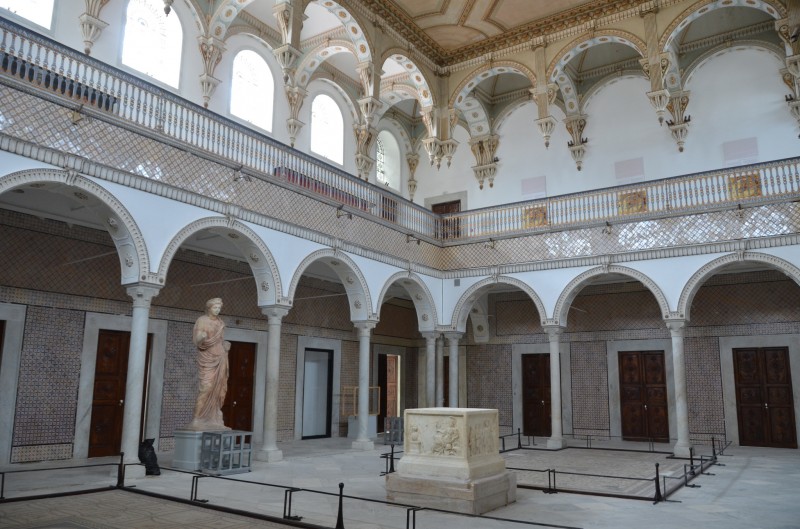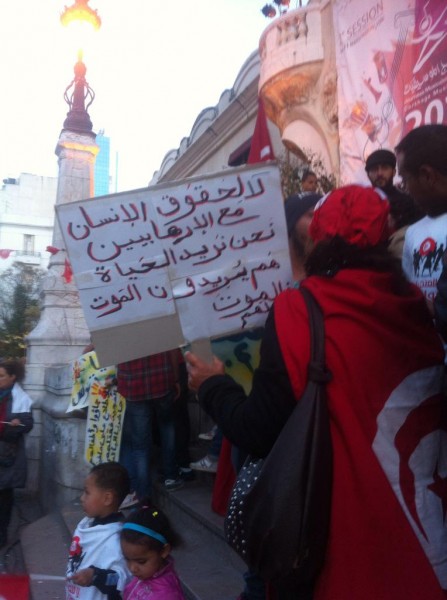
The Bardo Museum in Tunis, which has the largest collection of Roman mosaics in the world, will reopen to visitors next Tuesday. Photo by Richard Mortel shared on flickr under a BY-NC-SA Creative Commons license.
Tunisian activists and bloggers have been expressing concerns over rights setbacks in the aftermath of the deadly attack on the Bardo Museum, in Tunis, on Wednesday. In the attack, claimed by ISIS on 19 March, 20 tourists and a Tunisian police officer lost their lives. The two attackers were killed by police.
Following the attack, statements made by politicians and individuals calling for restrictions on rights and liberties and the use of capital punishment raised eyebrows among human rights activists.
Amin tweeted:
y a des tunisiens qui veulent moins de droits, liberté et démocratie pour combattre des gens qui sont contre la liberté et démocratie #logic
— Amin أمين (@AminKh) March 18, 2015
There are Tunisians who want less rights, less freedom and less democracy to fight those who oppose freedom and democracy
Wafa Ben Hassine warned:
Tunisian president Sebsi talks about ‘wiping these terrorists off the map’. Time to welcome even more curtails on freedom.
— Wafa Ben Hassine (@ousfourita) March 18, 2015
As the dramatic events were unfolding on Wednesday afternoon, Khawla Ben Aicha, an MP for the big-tent anti-Islamist Nidaa Tounes party which won the legislative and presidential elections in late 2014 tweeted:
Qu'on ne ns parle +de #droitsdelhomme ac ce genre d'individus,aucune indulgence!La loi doit être votée en tte urgence! #TnARP #AttaqueBardo
— Khawla Ben Aicha (@Khaw_laa) March 18, 2015
Let's never talk about human rights with this type of individuals, no indulgence. The law must be voted immediately
Ben Aicha was referring to a counter-terrorism draft law set to replace the 2003 law enacted by the former regime of Zine el Abidine Ben Ali. Passed under the pretext of preserving security, the 2003 law was deployed as a tool of oppression against peaceful dissent. According to Human Rights Watch, a draft law submitted to the constituent assembly in July 2014 — but eventually not adopted — contained several improvements over the 2003 law, yet its definition of what constitutes a terrorist activity remained broad and ambiguous.
Ironically, at the time of the attack members of the parliament, housed right next to the Bardo Museum, were debating the new anti-terrorism legislation. Speaking to Democracy Now, Amna Guellali director of the Human Rights Watch Tunisia office warned of “a more tightening of the security apparatus and sweeping anti-terrorism operations that would lead to some backsliding on rights”.
The parliamentarian's tweet prompted angry reactions from a number of Tunisian Twitter users:
Selim, a member of the parliamentary monitoring group AlBawsala, tweeted:
@Khaw_laa le déni des droits de l'homme ne résoudera pas le problème du terrorisme, au contraire, il le renforcera..
— Selim (@Selim_) March 18, 2015
Denying human rights won't solve the problem of terrorism, but will rather reinforce it…
Eya Turki responded:
@Khaw_laa Les droits de l'homme concernent absolument tout le monde, faites vous une raison et arrêtez de parler sous le coup de l'hystérie.
— Eya Turki (@EyaTurki) March 18, 2015
Human rights concern absolutely everyone. Think rationally and stop talking under the effect of hysteria
Tunisian journalist and blogger Malek Khadhraoui expressed his dismay:
@Khaw_laa t'es une véritable honte pour notre assemblée. Ait du respect pour les morts et garde ta propagande à deux balles pour toi
— Malek Khadhraoui (@malekk) March 18, 2015
You are an absolute disgrace to our assembly. Have some respect to those killed and keep your propaganda to yourself

At an anti-terrorism protest on Wednesday, a protester holds banner which reads “No to human rights with terrorists. We want life. They want death. So death is theirs.” Photograph shared on Twitter by @RymKH
In the aftermath of the attack, calls for the death penalty resurfaced. Supporters of Nidaa Tounes who gathered outside the parliament on the evening of 18 March demanded the use of capital punishment against those involved in “terrorism related activities”, privately-owned Radio Mosaique FM reported.
Tunisia has observed a moratorium on executions since 1991, though judges continue to pronounce death sentences.
la peine de mort à tout terroriste et toute personne qui soutient les terroriste à tout jihadiste en Tunisie et… http://t.co/r1TsAAI2Jd
— TOUNSSIA HOURRA (@DBELWAFA) March 19, 2015
The death penalty against every terrorist and every person who supports terrorism in Tunisia and every jihadist in Tunisia
Internet freedom was not spared from blame. The liberal Afek Tounes party, which is a member in the coalition government led by Prime Minister Habib Essid and has eight seats in the parliament, issued a statement calling for “waging a war against terrorism” and taking a number of measures, including declaring a state of emergency and adopting the counter-terrorism law. The party, whose leader Noomane Fehri heads the Ministry of Communication Technologies and Digital Economy, also called for filtering sites that incite terrorism and prosecuting those behind them. On the other hand, Essid announced that the ministries of Interior and Communication Technologies are cooperating through a ‘specialized agency to monitor sites that promote terrorism’.
These statements did not pass unnoticed in light of Tunisia's abusive history and restrictive internet legislation.
Lawyer Kais Berrjab tweeted on 19 March:
analyste, politicien .. si tu crois que #censure du #Net est une mesure efficace contre le #terrorisme … fermez la #AttackBardo #Tunisie
— Kaïs Berrjab (@OstezEdgar) March 19, 2015
Analysts, politicians…if you think censorship of the net is an effective measure against terrorism, shut it down
He added in another tweet:
c'est la fin de #NetFreedom en #Tunisie à cause de #BardoAttack #Filtrage potentiel et surveillance de masse et réduction de #Privacy #A2T
— Kaïs Berrjab (@OstezEdgar) March 19, 2015
This is the end of net freedom in Tunisia. As a result of Bardo attack, [there is the] possibility of filtering, massive surveillance and reduction of privacy
Previously considered an internet freedom enemy, Tunisia's interim authorities lifted internet filtering practices after the toppling of Zine El Abidine Ben Ali's, who had been in power for 23 years. This has allowed users in Tunisia to freely access the web and express themselves, including individuals who adopt extremist ideologies.
For instance, a number of tweets have been posted under the hash tag #غزوة_تونس (Tunis invasion) to celebrate the Bardo Museum attack and commemorate the gunmen.
Some politicians have also joined activists to call for respecting human rights in the fight against terrorism. Former president Moncef Marzouki said that “resorting to tyranny won't solve Tunisians’ problems” and called on the government not to make use of the Bardo attack to “take away what the revolution has snatched [from rights such as] freedoms of expression and opinion”.
MP Sayida Ounissi from the Islamist Ennahdha party tweeted the cartoon below on 21 March:
Despite the emotion, the worries and the temptation. We have to keep on the democratic path #Bardo #antiterrorism pic.twitter.com/L5f1woXf18
— Sayida Ounissi (@SaidaOunissi) March 21, 2015
Will Tunisia uphold liberty and freedom while it battles militants?







2 comments
There is a good article on this.
http://theworldouttherelocke.blogspot.com/2015/03/isis-tunisia-and-israel.html